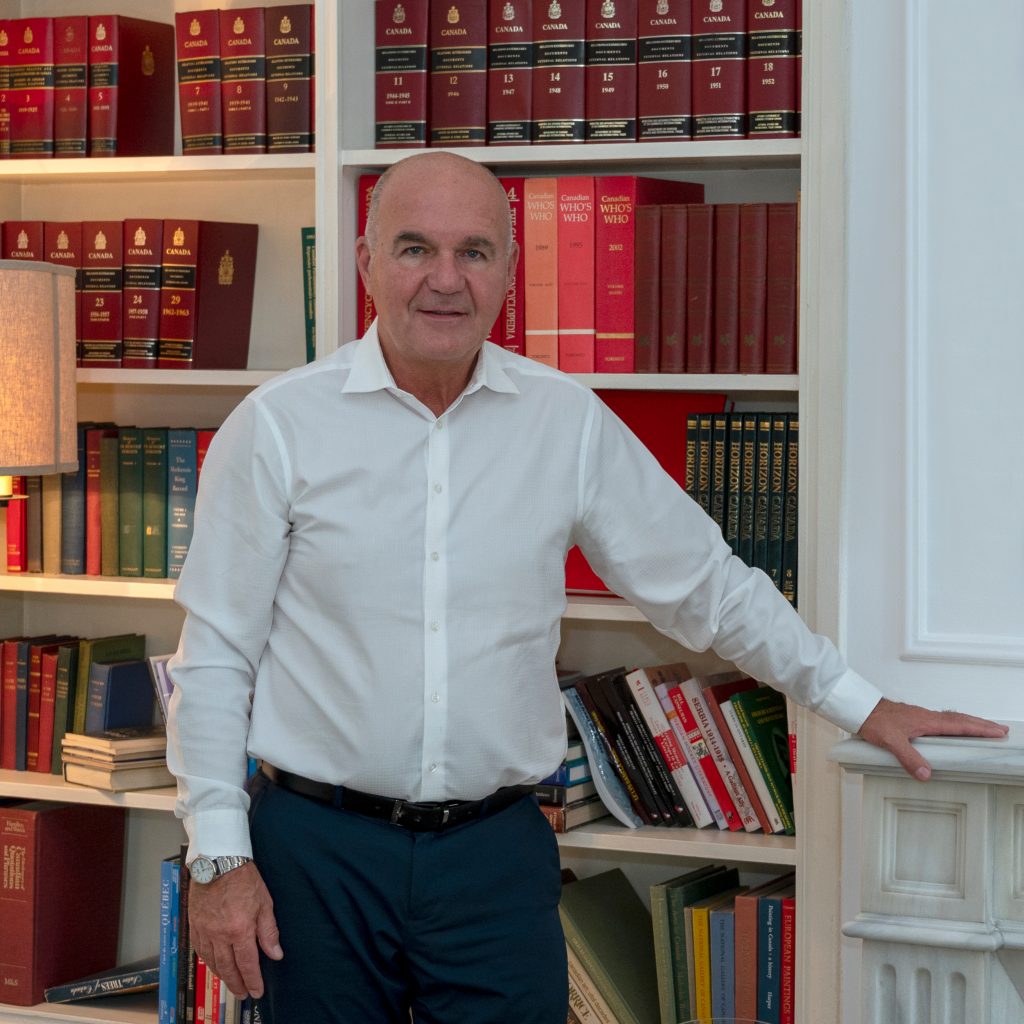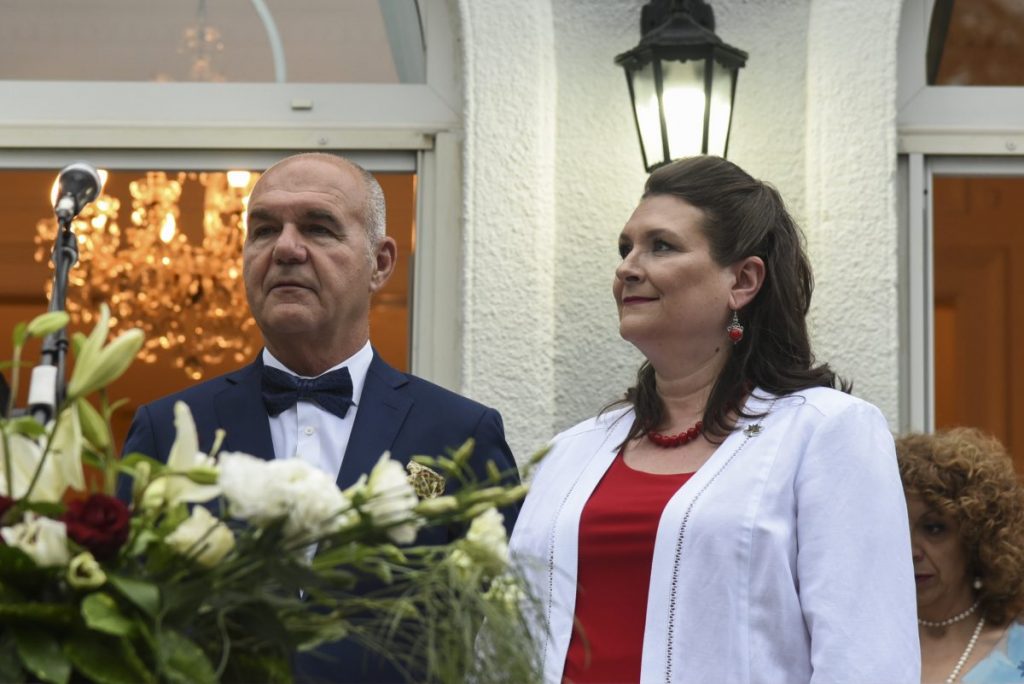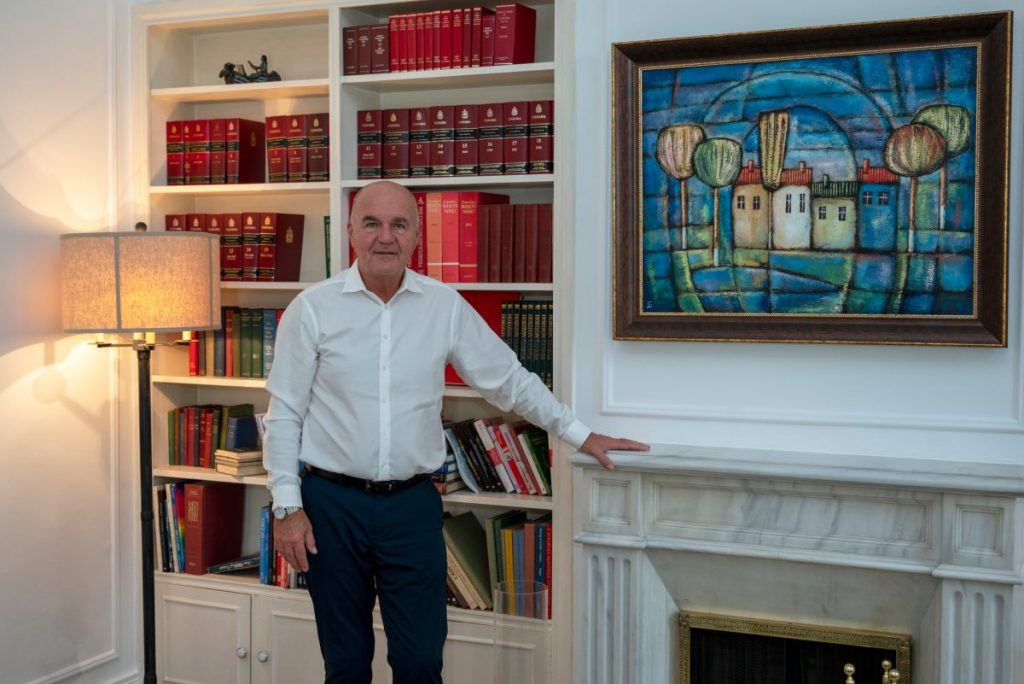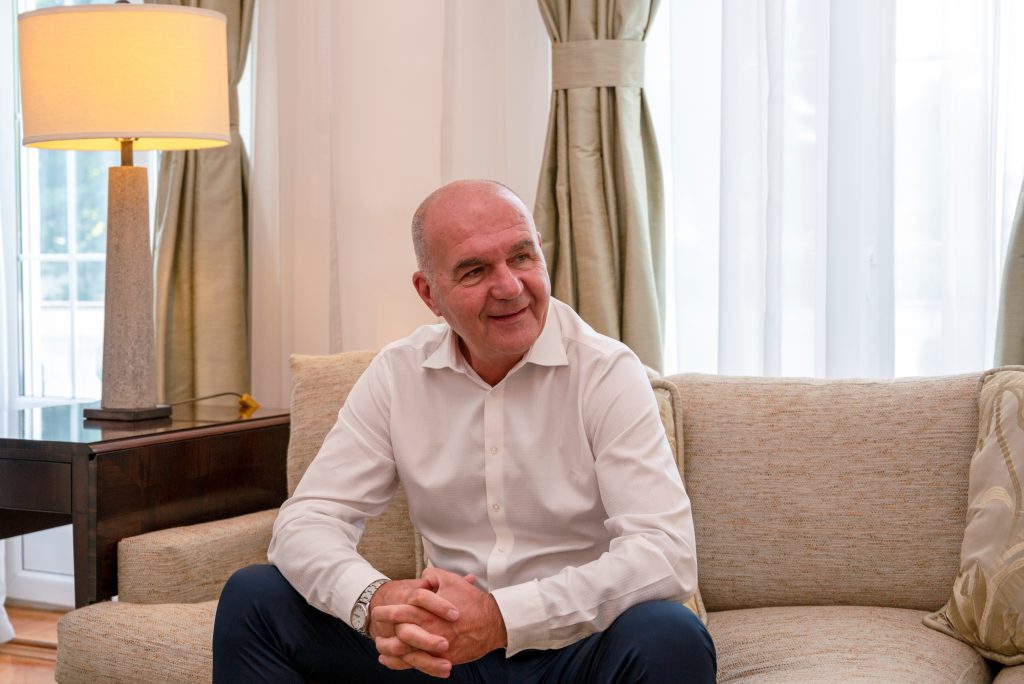People and its spirit are what make Belgrade so unique. They are Belgrade’s advantage because this city is entwined with people, kindness and warmth.
A friend of our magazine and the husband of the Canadian ambassador to Serbia, Nećko Krupalija, told us honestly and emotionally about the end of the ambassador’s term in Belgrade, places that he and his wife lived in and what they were taking with them from Belgrade. There were tears and laughter, and most of all, the wonderful and warm words of this great man, who will be missed by the entire staff of D&C magazine, including Robert Čoban, as well as the social scene in Belgrade. “I have to be honest with you. When we came to Belgrade, it took me a couple of months to get used to living a so-called emotional life. It was as if I came back home but with a new view of everything. I returned to the Balkans, although I fought not to return. But I did and that really affected my life in Belgrade – that feeling and the people, ” Nećko talks about his arrival in Belgrade.

You grew up in Sarajevo, lived on several continents, in Canada, Europe, Russia, Ukraine, Africa… What sets Belgrade and Serbia apart?
That’s a very layered question. Growing up in Sarajevo was quite idiosyncratic. Sarajevo is my kind of town. It has a special spirit and much more than that, of course. Leaving Sarajevo gave me another dimension. I found myself in a situation where I started thinking with a completely different mentality and new vistas opened up for me. You can leave the Balkans, but Sarajevo will never leave you. It stays with you forever.
Coming to Canada meant starting a new life. It was a new life, undoubtedly. I travelled with two suitcases and arrived in Ottawa on November 22, 1999. The weather was -27 degrees Celsius. I looked around and said to myself – “Where on earth did I come to?” From that day and from that moment, it was a new beginning, with my Kati. After that, we lived in many different cities and countries and we never knew how long we were going to stay in them.
I have an anecdote to tell you about Moscow. In 2005, I sold all the restaurants I owned and when I was told that we were going to live in Moscow, I said to myself “excellent, but we are going to stay there for two years exactly; not a day longer”. And I was adamant about that. However, our stay automatically extended into the third year and then into the fourth for which we had to get special approval . I asked if we could stay for another year after that, but was told “no”. After all, we stayed for two years longer than anticipated. You never know what you will take a fancy to.
“ It took me literally 12 seconds to decide that we should go to Belgrade. I told her we are going back home. And that’s how it was. These last three years we spent in Belgrade felt like home”
And then we went to Kyiv, from Kyiv we went back to Canada again and then came to Africa which I fell in love with. Why am I saying all this? All those cities and all those continents had something special. I remember one April when Kati came a little earlier from the embassy and just said: “I have good news – Belgrade!” I thought of what Belgrade was at that moment and said to myself “I hope they didn’t start bombing it again”, but that can’t be the good news… Kati then said: “They offered me the position of the Canadian ambassador to Serbia”. It took me literally 12 seconds to decide that we should go to Belgrade.
I told her we are going back home. And that’s how it was. These last three years we spent in Belgrade felt like home. I was crying a few moments ago. I cry for my Sarajevo as well but believe me, Kati and I have been hiding and crying for the last ten days because we are leaving. Belgrade has its own unique soul. It has people who are made of emotions. Belgrade’s essence lies in emotions. That’s the fabric that Belgrade is made of – the uniqueness of people here. Buildings and streets are the same everywhere in the world, believe me. Moscow, Kyiv, Paris, London…. I’ve travelled to almost 60 countries around the world, I’ve visited all the big cities, seen everything and everyone, met with high officials and great presidents, Putin and the like. Buildings are the same everywhere you go, but it’s the people that make up the city and that is a huge advantage for Belgrade. These people, the fabric of their soul, their warmth, kindness and spontaneity – that’s Belgrade. The spontaneity of living… You go to a café you’ve never been before and everyone knows you there, everyone greets you with “Hey, how you’re doing? What’s up?” Belgrade moments like these free you from shackles of the protocol.

It is not easy to be in diplomatic missions around the world. There are also many sacrifices to be made. How easy or difficult this is considering that the general notion is that it is a terribly easy job?
I am going to answer your question with a statement. I have been hearing lately that when husbands of government ministers were asked what they would like to be, their response was “Nećko”. I am telling you the truth. However, they do not know the background of my life and what it is like to be the husband of an ambassador. A lot is involved and there are too many sacrifices to be made. First, a Balkan man needs to overcome his ego to be this. When a man succeeds in overcoming his ego, he’ll do good no matter where in the world he is. We had a plan as a family, we had a common goal. We knew that it was not going to be easy to achieve all that Kati has achieved in diplomacy and what we have achieved together, i.e. to be an ambassador of a country. We had that plan but we didn’t expect that everything will just happen for us. A lot of sacrifices were made during that period.
“We must understand that there are situations where a man needs to overcome himself”
First, when you come to the Balkans, people will tease you with “oh, you married well” and the like. I learned a long time ago not to pay any attention to that because I have been travelling across the world, meeting people, getting to know how other nations live… I have overcome that and can laugh it off.
But the sacrifices are huge because at the same time you are building a family and raising your children. We had to talk to our children a lot because we were frequently moving and changing environments. Children get used to having one set of friends and then they have to leave. That was terribly difficult to explain to them. As we change countries and sometimes continents, they have to leave their friends behind. That’s not easy. You have to give up all those things that are an integral part of you, your emotions and personality. You are dealing all of that just to see a result in the end. That result always comes and I can never understand people who cannot move forward because of their outdated understanding of life. Basically, all my struggles were about overcoming myself.

What can Canada learn from the Balkans and vice versa? What can we give to each other and what can we take from each other?
That has to be a two-way street. We can learn a lot from each other. I will first start with what the Canadians should and could learn from our mentality. These are openness, readiness to socialize, showing emotions when socializing, seeing and understand that not everything boils down to hard capitalism, that there is enjoyment in life…
What could we learn from Canada? The list is much longer. We could learn about how to understand things in life. Everything revolves around life. That’s not a very profound philosophy. We can learn from the Canadians that work habits and obligations must be priority if a person wants to raise a family, and the family is the essence and main element of life. Work allows you to generate prosperity and have perspective. I don’t meet a lot of our people in Canada because that creates a problem for me and gives me a headache. Nostalgia is weird. I can understand being nostalgic about certain cultural events, but being nostalgic for rakija and ćevapi…. I tell people that I am nostalgic about cultural events, tradition, my mum and dad, my childhood, a corner of a room where I used to read books… That kind of nostalgia is normal.
That’s something you can learn from the Canadians, i.e. how to exorcise the nostalgia from yourself. They are very hard-working people. They are not that interested in politics, and some of them don’t even know who Trudeau is. Simply put, most of their brain space is taken by the business. We can learn from them how to work, how to plan, how to combat corruption. Their state officials are moral and have an obligation towards the Canadian people. The state guarantees a better life for every citizen.
Canada also has its shortcomings like their health system, but we could learn about all the rest from them. Another thing that we need to learn from them, and I stand firmly behind this, is gender equality and the LGBT population. No-one there is judgemental. We simply have to eliminate that kind of primitivism from our lives. We have such a good history, such good artists, singers, writers and actors and everything else, and we simply need to throw that kind of primitivism out of the Balkans.
Did the coronavirus bring something good in terms of returning to certain values that we had forgotten?
I was quarantined for 38 days until the measures were lifted, so I experienced firsthand what isolation means. I think that one day, and I hope that comes soon, when all this is over, we will want to experience the coronavirus again, just for two days, in order to slow down and to start looking at God and everything else from the right point of view. It will take us some time to understand that this country exists for us and not vice versa and that we do not have to constantly rush everywhere. I have a feeling that the coronavirus has changed our mental attitude even when socializing. Friendships have become closer and more sincere than they were a year ago. Family has become a real symbol. Now, mum and dad have time for children and themselves. Family comes first in my life. When they ask me what you like the most, I say that my answer is a complex one but that my family always comes first and that I consider it sacred and untouchable; followed by wine and everything else. Then they ask what I mean when I say wine and I usually reply that everything is better after having two bottles of wine. If there is anything positive about this pandemic, it is that it brought people closer together and made the family a family again in the true sense of the word.

What kind of impressions are you taking with you from Belgrade? When are we going to see you again? Are you going to visit us?
Oh, come on, you are going to make me cry again. I would love to come again here. But my wishes need to be attuned to my reality. We are leaving for a place that is far away, on another continent. I would like nothing more than to live here permanently but the reality is completely different. What I am taking with me from Belgrade? First and foremost, myself. I gave myself entirely to Belgrade and truth be told, counting all the wonderful times I had and all the friends I made, including Robert Čoban who became my really good pal, then my friend Boki from Vino Bar, Željko, Raka Marić, Boba Živojinović and all the others – I am going to take all of them and you with me and that’s a huge wealth for me. I am also going to take Knez Mihajlova Street with me and Tikas and all the rest. I am going to take all of you with me in my heart and soul and I will never forget you. I think it would be a terrible sin to forget friendships because what happened to me in Belgrade will probably never happen to me anywhere I go. It can’t happen anywhere else because it is only mine and unique.
“Mayor of Addis Ababa”
What memories do you have of Africa?
Africa is Africa! We spent almost two and a half years in Ethiopia. Coming to Belgrade interrupted our adventure as we were supposed to spend our third and fourth year in Ethiopia. You either love or hate Africa. OK, “hate” is maybe too strong of a word which I don’t like using as I don’t hate anyone. I cannot stand something or someone rather than hate. You fall in love with Africa because the people who live there are pure geniuses – they either dance, sing or laugh. I have never seen anyone angry there. Another thing… We were lucky to be stationed in Ethiopia which is in the heart of Africa. Ethiopia is home to the United Nations offices, the African Union, the European Union and over a hundred embassies, so it is the diplomatic centre of the whole of Africa. We felt so lucky living there. Again, Nećko was true to himself there too and earned himself the nickname “Mayor of Addis Ababa”.
By Ruža Veljović &Tanja Banković